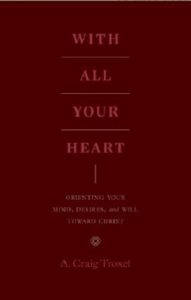 As A. Craig Troxel points out in With All Your Heart: Orienting Your Mind, Desires, and Will Toward Christ, Crossway, 2020, the English word heart translates one Greek and two Hebrew words found in Scripture and it is the most used English word in the Bible with just over a thousand occurrences (p. 17). The author is Robert G. den Dulk Professor of Practical Theology at Westminster Seminary, California, who served in pastoral ministry for several years in a congregation in Pennsylvania and another in Illinois. Introducing his presentation are numerous ways in common conversation the word heart is used such as, “He wears his heart on his sleeve,” indicating one who does not hide emotions; “coldhearted” is insensitive, even merciless, callous, or cruel; “cross my heart” is effectively swearing an oath that one is telling the truth (the flip side of which is without heart crossing veracity should be doubted); and several other common examples.
As A. Craig Troxel points out in With All Your Heart: Orienting Your Mind, Desires, and Will Toward Christ, Crossway, 2020, the English word heart translates one Greek and two Hebrew words found in Scripture and it is the most used English word in the Bible with just over a thousand occurrences (p. 17). The author is Robert G. den Dulk Professor of Practical Theology at Westminster Seminary, California, who served in pastoral ministry for several years in a congregation in Pennsylvania and another in Illinois. Introducing his presentation are numerous ways in common conversation the word heart is used such as, “He wears his heart on his sleeve,” indicating one who does not hide emotions; “coldhearted” is insensitive, even merciless, callous, or cruel; “cross my heart” is effectively swearing an oath that one is telling the truth (the flip side of which is without heart crossing veracity should be doubted); and several other common examples.
Even though it might be assumed a definition of heart is not needed, the author shows in his introduction that a precise meaning is required because the definition currently held is wanting.
The heart is the governing center of a person. When used comprehensively, it describes the complexity of our inner being—as composed of mind (what we know), desires (what we love), and will (what we choose). (p. 21)
In the West where the heart is viewed, as the author points out, to be the center of love, romance, and feelings, his definition is contra-intuitional. After all, “the heart is a lonely hunter,” seeking romance and companionship; “places in the heart” are indicative of emotional love for others, family, or friends; and “two hearts beating as one” describe those bound to one another in inseparable love. But the author’s definition is drawn from the specific teaching of Scripture as well as the cultural sensitivities of the Hebrews of the Old Testament and the Gentiles of both testaments. When David is described as “A man after God’s own heart,” in 1 Sam 13:14 (Acts 13:22), it is not tying David’s heart to that of the Lord in some emotional interpersonal way, but instead is showing that his heart was directed fully in mind, desires, and will to follow God—one who is after God’s own heart is one fully dedicated to glorifying and enjoying him. John Calvin’s personal seal illustrates a heart in hand given to God promptly and sincerely indicative of his discipleship in full, nothing withheld. David as a man after God’s own heart was fully dedicated to the Lord as a forgiven sinner. He was anointed the king of Israel and served well until he committed adultery, conspiracy, and murder. Even those hearts given to God in response to his grace sometimes grievously sin, but grace brings repentance, as was the case with David, and the heart is renewed and redirected.
With All Your Heart is divided into four parts—Knowing, Loving, Choosing, and Keeping with each having three chapters except the last which has four (indicative that keeping is the most challenging, or maybe the 13 chapters are intended for quarterly lessons). The emphasis of the first two or three chapters is on sin and its pervasive hold on those apart from grace. The author is fully aligned with Scripture in his emphasis on sin as exemplified by Ephesians, “And you hath he quickened, who were dead in trespasses and sins” (2:1). The author does not say this, but it seems his purpose, whether consciously or not, was to employ Martin Luther’s (the Reformation’s) schoolmaster purpose of the Law which is to bring sinners to recognize their hearts are as Jeremiah said, “desperately wicked” (Jer 17:9), so much so that the Lord will give a “new heart…and a new spirit…within you” (36:26). As the book progresses from the opening part, sanctification with continued reflection and repentance are brought out by the author as he encourages readers to orient their hearts toward Christ.
My greatest impression of the book is that it is thoroughly exegetical. I did not count them, but it seems he may have addressed all of the thousand passages containing the word heart. The Scripture index following the 196 pages of text occupies eighteen pages of the book. He did not quite quote from every book in the Bible, but he came close. With All Your Heart is the type of book needed today. An often-used passage for giving charges to ministers when they are installed in churches is 2 Tim 4:1-5.
I charge thee therefore before God, and the Lord Jesus Christ, who shall judge the quick and the dead at his appearing and his kingdom; Preach the word; be instant in season, out of season; reprove, rebuke, exhort with all longsuffering and doctrine. For the time will come when they will not endure sound doctrine; but after their own lusts shall they heap to themselves teachers, having itching ears; And they shall turn away their ears from the truth, and shall be turned unto fables. But watch thou in all things, endure afflictions, do the work of an evangelist, make full proof of thy ministry.
These verses are not prophetic in the sense that they speak of a single future era when Timothy or a generation following him will have to teach truth in opposition to those who scratch ears with their theologies, but instead it is prophetic in that the faithful minister will always be challenged by proponents of errors adopted to appeal to those with itching ears. If the Bible is in fact the revelation of God’s will, and it is, then it is the duty of ministers and teachers to exposit it faithfully. Dr. Troxel’s With All Your Heart provides a precise exegesis and exposition of what both testaments have to say about the heart, its fallen condition, and its resurrected life through the grace of Christ. The previously mentioned Scripture index is convenient for preachers and teachers to access the author’s thoughts concerning the use of heart in any passage they may be teaching. This is a book that is not only instructive, but convicting and encouraging as it provides hope through the grace of Christ. It is highly recommended.
Barry Waugh
Notes—The copy of the book used for this review was provided by the publisher, Crossway; the image of the cover has been over enhanced in an attempt to have sufficient contrast between the background and text for reading. The header image is from Pixabay and was located using the search “bookshelf.” Readers may also be interested in Troxel’s article, “What did Augustine ‘Confess’ in his ‘Confessions’?,” Trinity Journal, Vol: 15:2 (Fall 1994): 163ff; it may be that Augustine’s depth of inquiry into the heart seeded Troxel’s interest in more extensive study of the heart in Scripture. See “The Calvin Seal: A Constant Reminder,” by Barbara Carvill, Professor Emeritus of German, for one account of the development of Calvin’s logo. John Calvin was mentioned in this article and a nicely done biography of him is Robert Godfrey’s John Calvin: Pilgrim and Pastor, Crossway, 2009; the author’s approach provides a broader view of Calvin’s life and ministry than the historical-theological studies that concentrate on his writings.





